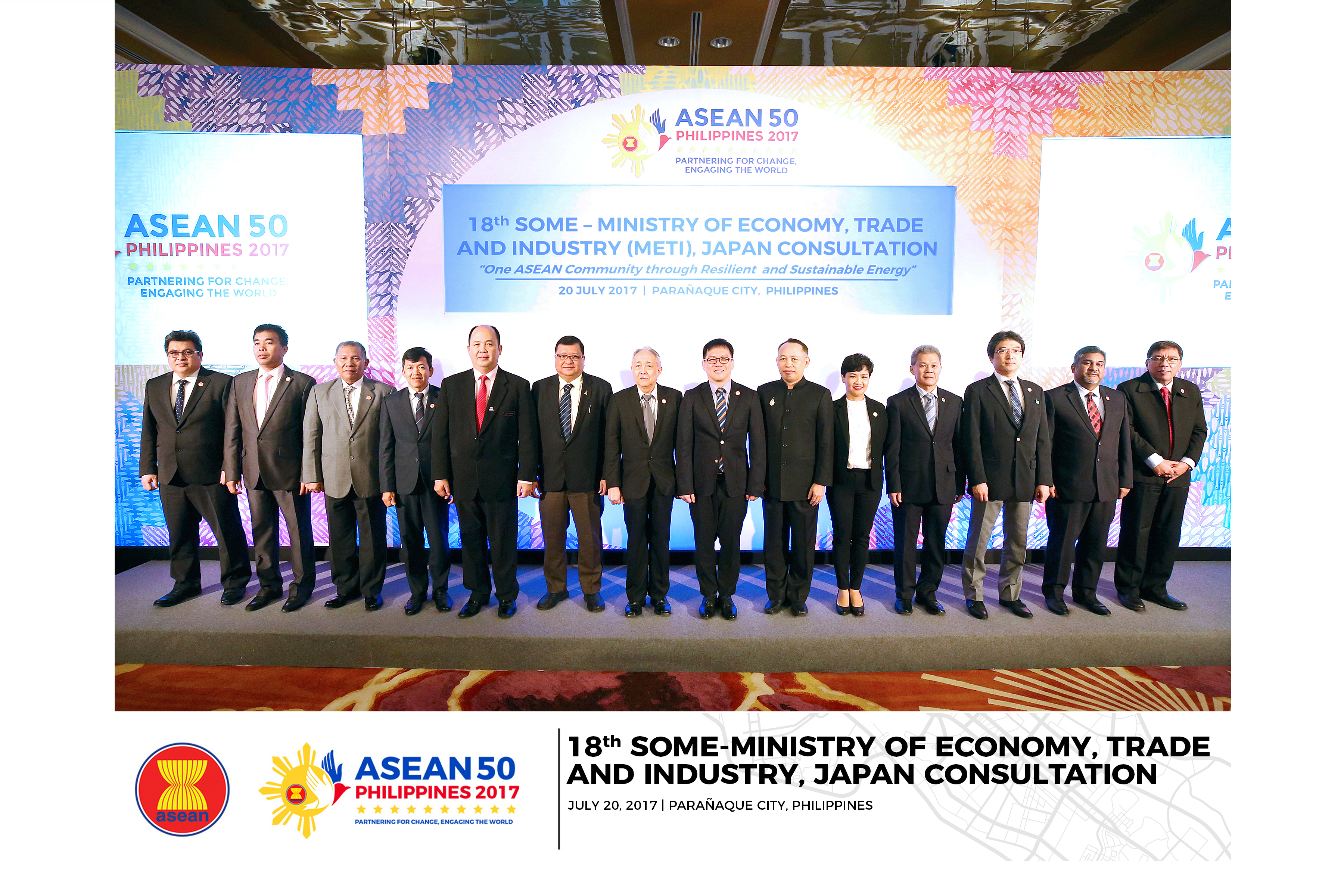Menu
 The Eighteenth ASEAN Senior Officials Meeting on Energy – Ministry of Economy, Trade, and Industry of Japan Consultations for ASEAN-Japan Energy Cooperation (18th SOME-METI Consultations) was held on 20 July 2017 in Parañaque City, Manila, Philippines. Being organised in the year of ASEAN 50th anniversary, the Meeting highlighted the long and fruitful cooperation between ASEAN and Japan. The Meeting was co-chaired by Mr. Jesus Cristino P. Posadas, Undersecretary and Senior Officials on Energy (SOE) Leader for the Philippines, and Mr. Masaomi Koyama, Director for Overseas Energy Infrastructure Office Agency for Natural Resources and Energy and SOE Leader for Japan.
The Eighteenth ASEAN Senior Officials Meeting on Energy – Ministry of Economy, Trade, and Industry of Japan Consultations for ASEAN-Japan Energy Cooperation (18th SOME-METI Consultations) was held on 20 July 2017 in Parañaque City, Manila, Philippines. Being organised in the year of ASEAN 50th anniversary, the Meeting highlighted the long and fruitful cooperation between ASEAN and Japan. The Meeting was co-chaired by Mr. Jesus Cristino P. Posadas, Undersecretary and Senior Officials on Energy (SOE) Leader for the Philippines, and Mr. Masaomi Koyama, Director for Overseas Energy Infrastructure Office Agency for Natural Resources and Energy and SOE Leader for Japan.
The Meeting expressed greater confidence that the cooperation between Japan and ASEAN in the field of energy would lead to enhanced energy security and sustainable energy development. ASEAN and Japan are determined to bring the cooperation activities to the next level by addressing the key regional challenges faced by the ASEAN Member States (AMS) in implementing the ASEAN Plan of Action for Energy Cooperation (APAEC) 2016-2020.
The Meeting exchanged views on recent policy developments in Japan and ASEAN on energy efficiency and conservation (EE&C) measures towards a low-carbon ASEAN. The Meeting emphasised the commitment for collective actions as a means to promote widespread EE&C improvement and to address both regional and global challenges in energy and environmental protection. The Meeting appreciated the successful implementation of SOME-METI Work Programme 2016-2017 and reaffirmed its support for the action plan 2017-2018, policy studies, and human resources development in EE&C.
The Meeting also welcomed the interest of Japan to engage further with the region through customised programme areas, such as: liquefied natural gas; efficient power plant; clean coal technology; and EE&C in order to meet the need and priorities of each AMS. The Meeting looked forward to the implementation of various EE&C programmes, namely: i) formulation of technical EE guidelines for energy management; ii) capacity enhancement for energy managers; iii) introduction of advanced energy manager qualification system; and iv) development of energy management manuals for energy intensive industries (iron/cement/textile/others)
Recognising that the total final energy consumption of the region is projected to reach 1046 Mtoe in 2040, and increase by a factor of 2.4 times, the Meeting reiterated their resolve to step up individual and collective efforts by AMS to ensure secure, stable, affordable and environmentally sustainable energy supplies. ASEAN Centre for Energy shall continue to serve as a key role in the initiation, facilitation, integration and implementation of regional EE&C programmes and activities. To encourage the partnership, ASEAN expressed appreciation and gratitude to METI Japan for the continued generous support to EE&C development in the region. (RJPS. Featured photo credit: The Philippine DOE)
